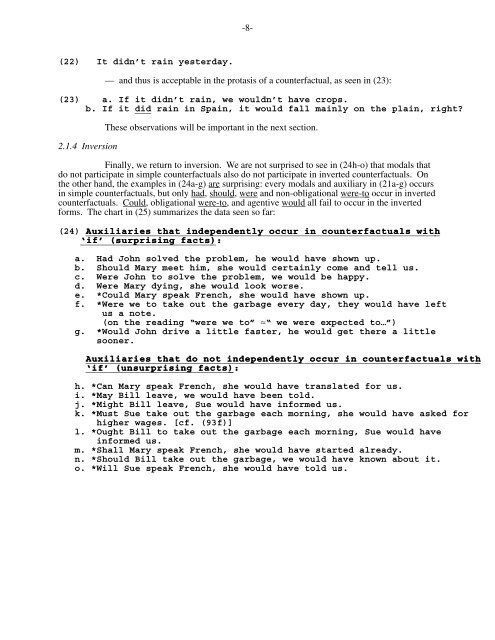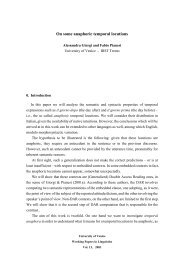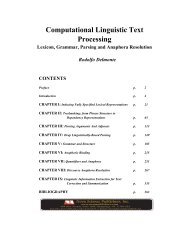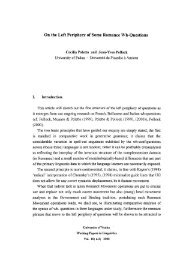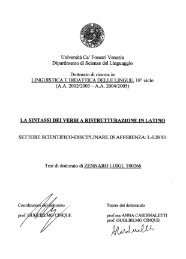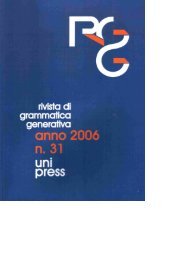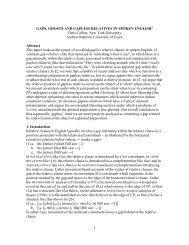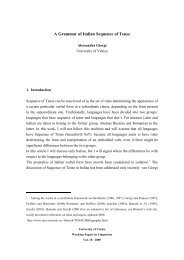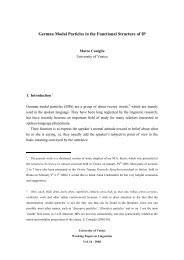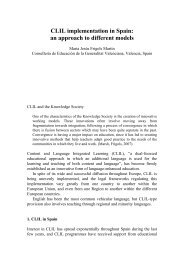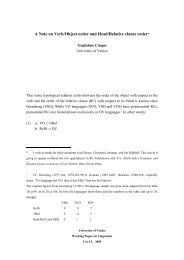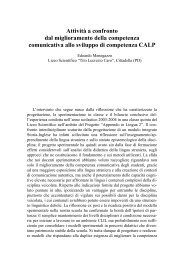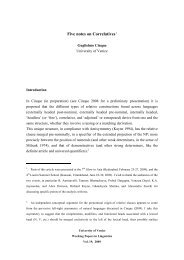Earliness Principle - Lear
Earliness Principle - Lear
Earliness Principle - Lear
Create successful ePaper yourself
Turn your PDF publications into a flip-book with our unique Google optimized e-Paper software.
(22) It didn’t rain yesterday.<br />
-8-<br />
— and thus is acceptable in the protasis of a counterfactual, as seen in (23):<br />
(23) a. If it didn’t rain, we wouldn’t have crops.<br />
b. If it ___ did rain in Spain, it would fall mainly on the plain, right?<br />
2.1.4 Inversion<br />
These observations will be important in the next section.<br />
Finally, we return to inversion. W e are not surprised to see in (24h-o) that modals that<br />
do not participate in simple counterfactuals also do not participate in inverted counterfactuals. On<br />
the other hand, the examples in (24a-g) are ___ surprising: every modals and auxiliary in (21a-g) occurs<br />
in simple counterfactuals, but only had, __ _ should, _____ _ were ___ _ and non-obligational were-to _______<br />
occur in inverted<br />
counterfactuals. Could, _____ obligational were-to, _______ and agentive would _____all<br />
fail to occur in the inverted<br />
forms. The chart in (25) summarizes the data seen so far:<br />
(24) _________________________________________________________________<br />
A u x i l i a r i e s t h a t i n d e p e n d e n t l y o c c u r i n c o u n t e r f a c t u a l s w i t h<br />
‘ _________________________<br />
‘ i f ’ ( s u r p r i s i n g f a c t s ) :<br />
a. Had John solved the problem, he would have shown up.<br />
b. Should Mary meet him, she would certainly come and tell us.<br />
c. Were John to solve the problem, we would be happy.<br />
d. Were Mary dying, she would look worse.<br />
e. *Could Mary speak French, she would have shown up.<br />
f. *Were we to take out the garbage every day, they would have left<br />
us a note.<br />
(on the reading “were we to” ≈“ we were expected to…”)<br />
g. *Would John drive a little faster, he would get there a little<br />
sooner.<br />
________________________________________________________________________<br />
A u x i l i a r i e s t h a t d o n o t i n d e p e n d e n t l y o c c u r i n c o u n t e r f a c t u a l s w i t h<br />
___________________________<br />
‘ i f ’ ( u n s u r p r i s i n g f a c t s ) :<br />
h. *Can Mary speak French, she would have translated for us.<br />
i. *May Bill leave, we would have been told.<br />
j. *Might Bill leave, Sue would have informed us.<br />
k. *Must Sue take out the garbage each morning, she would have asked for<br />
higher wages. [cf. (93f)]<br />
l. *Ought Bill to take out the garbage each morning, Sue would have<br />
informed us.<br />
m. *Shall Mary speak French, she would have started already.<br />
n. *Should Bill take out the garbage, we would have known about it.<br />
o. *Will Sue speak French, she would have told us.


